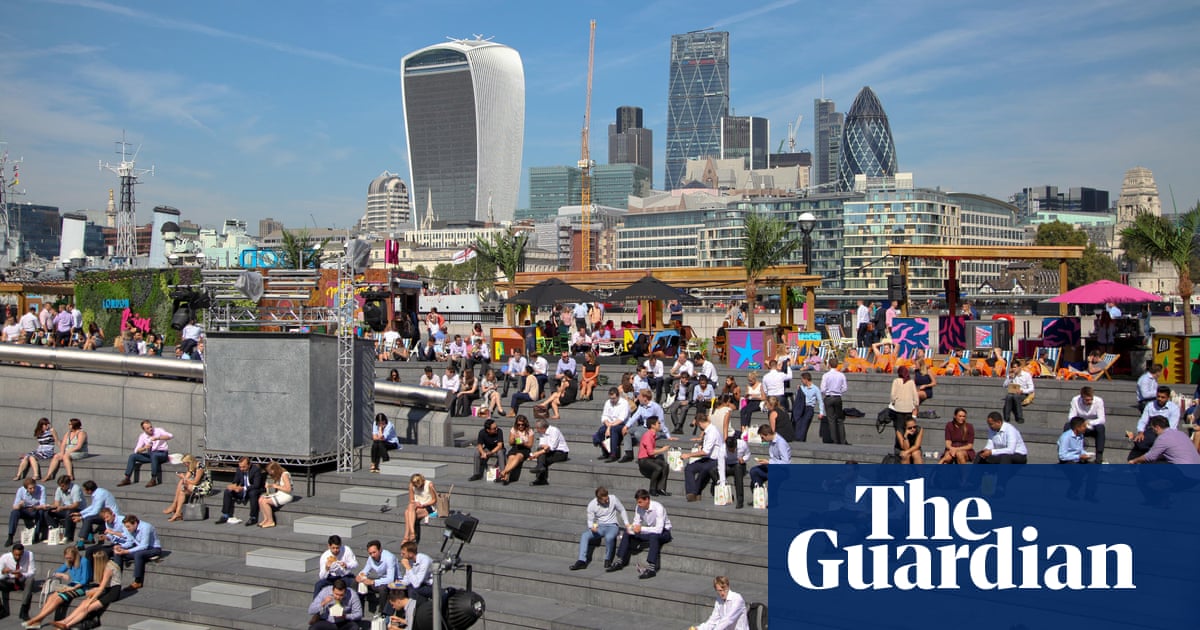A maximum indoor temperature working law giving people a day off if workplace temperatures surpass 30C should be mandated by government, a new report recommends.
The report by the Fabian Society thinktank highlights inequalities in who bears the brunt of the impacts of climate breakdown and puts responsibility on bosses and landlords to stop people from overheating.
An increasing number of people are dying from excessive heat in the UK. More than 4,500 people died in England in 2022 due to high temperatures, which was the largest figure on record. Between 1988 and 2022, almost 52,000 deaths associated with the hottest days were recorded in England, with a third of them occurring since 2016, data from the Office for National Statistics shows. During the same 35-year period analysed, more than 2,000 people died in Wales due to the warm temperatures.
86 F for Americans.
Seems warm for manual labor, seems fine for typing.
Ehh, my ac unit wasn’t working properly this summer. I’m in the southern US. It would get up to 85° F in the house and I’d be pretty sweaty by the end of the day.
Sure, it was fine, but it wasn’t comfortable by any means.
I’m guessing the humidity was way lower wherever you were comfortable at 30°C, it’s fine at the beach but in Britain it makes your brain start to melt!
Where do you live? I’ve never seen that enforced in the US.
I am afraid you have responded to the wrong comment. I said nothing about the US rules, I was changing temperature measurement standards.
Oh yeah we need this rule in Australia. I’d be going home right now!
Ah mate! It’s 40 degrees tomorrow with severe fire warnings, fucken oath we should have the day off. Might as well give us off until after Chrissy as it’s gonna be a scorcher.
Hmm, the issue here is that the office temperature is lower than the temperature if I’m working from home, so all it would mean is I’d be forced to go into the office on my WfH days! At least I’d be cool until I go home again I guess…
I’m wondering how long it takes until climate activists start advocating against it (because it would increase the use of AC and thus emissions/energy use, and decrease the amount of people suffering from the heat).

I think companies wouldn’t want to let their employees get off free, so they will probably be the first ones to be against this.
Not sure why climate activists would want people to suffer. Everyone is still hot, doesn’t matter if working or not
Of course companies will be against it.
Not sure why climate activists would want people to suffer.
Some because they think it’ll make people more aware of the problem and create more pressure to act, others because they think suffering is a virtue, people deserve it for what they have done to earth, and similar nonsense positions.
I feel like you’re just having imaginary arguments in your head with people who don’t exist. This is a net win for everyone because it means less people suffering in extreme conditions and it also puts pressure on companies and people with money to slow climate change.
Maybe there’s some weird people out there who want others to suffer but I doubt that’s anywhere near representative of climate activists.
Seen it far too often unfortunately.
And in some cities they got air conditioning banned or de-facto banned (made so expensive with additional hurdles that it’s unaffordable for most, ironically often leading to people using extremely inefficient hose-out-the-window monobloc units that you can buy without asking anyone for permission).
That sounds pretty silly, the real changes need to come from the ways we generate our electricity, not how individuals use it. I’m mostly just surprised activists managed to affect policy at all, though. But still that sounds more misguided than malicious.
I’m all for improved passive cooling measures before we jump to using A/C.
This is the best summary I could come up with:
The report by the Fabian Society thinktank highlights inequalities in who bears the brunt of the impacts of climate breakdown and puts responsibility on bosses and landlords to stop people from overheating.
Drawing on advice from experts from a range of organisations including the National Infrastructure Commission, the London School of Economics and the University of Oxford, the Fabians have drawn up a plan to prevent illness and death from the increasing extreme heat predicted to happen in the UK due to climate breakdown.
It found that “low-paid workers often lack sufficient access to water, can not escape the heat, and have to wear uniforms or personal protective equipment (PPE) designed for cooler temperatures.” Hospitality and manual workers are most likely to face excessive heat, but also employees in education establishments and offices can suffer if they are working on higher floors or in areas with big windows and poor ventilation.
The report also calls for tougher climate resilience requirements on infrastructure providers, and a ban on the burning on upland peatlands as well as investment in the maintenance of flood defences currently in poor condition.
It says: “The Conservative government’s most recent National Adaptation Programme lacks substantive new plans or investment to prepare for future climate impacts.
The report also warns that the electricity system, transport infrastructure and schools and hospitals could all be at risk of shutdown due to overheating.
The original article contains 565 words, the summary contains 232 words. Saved 59%. I’m a bot and I’m open source!








